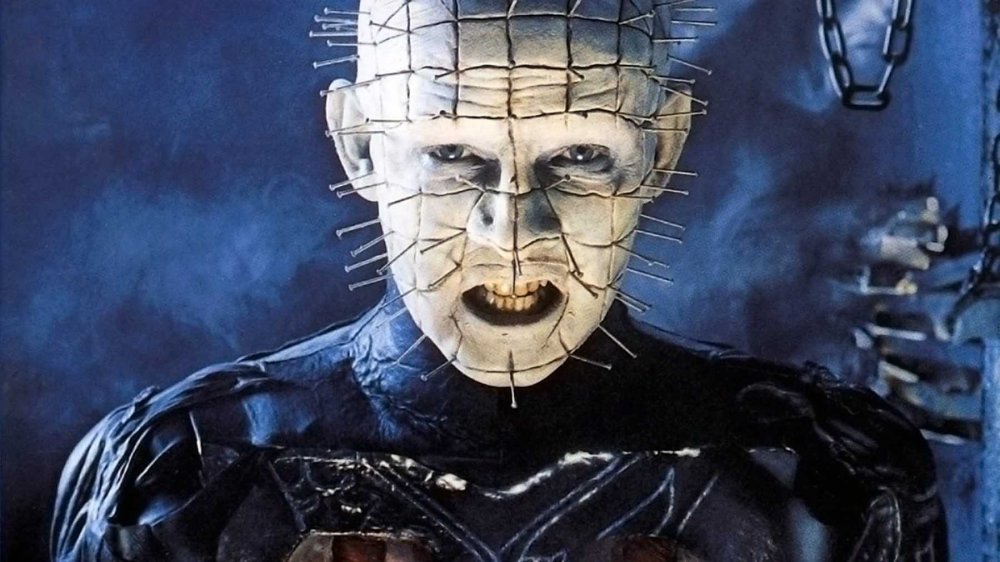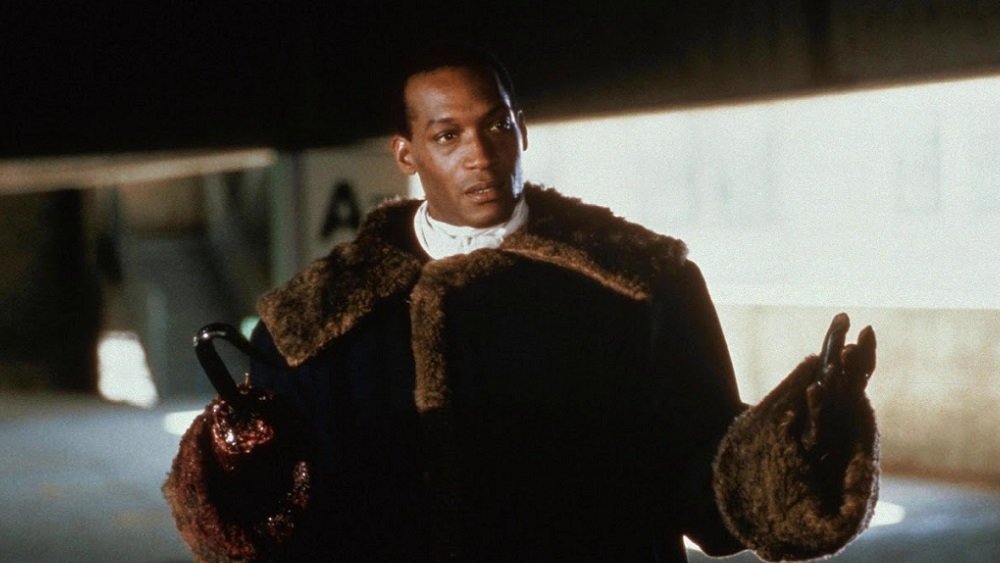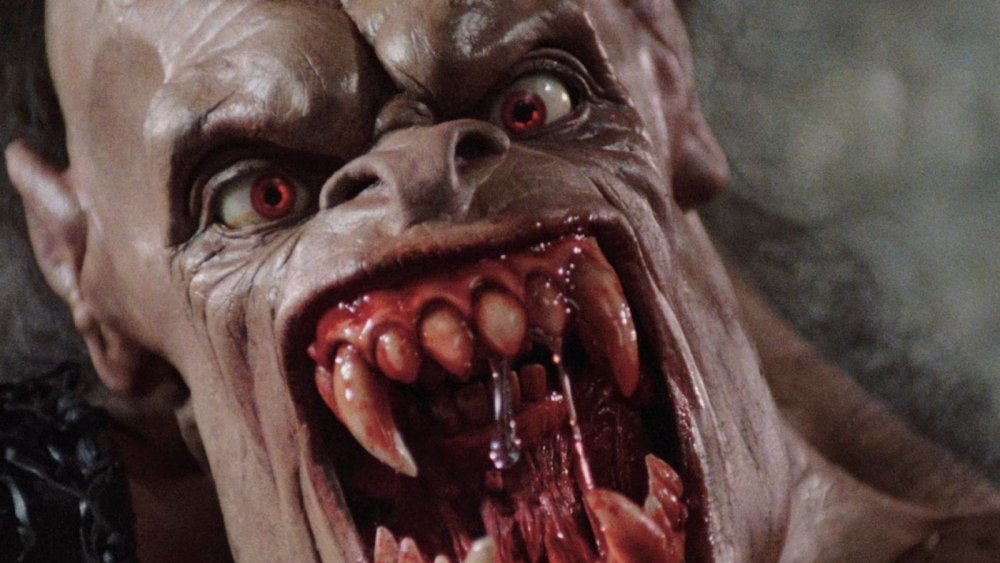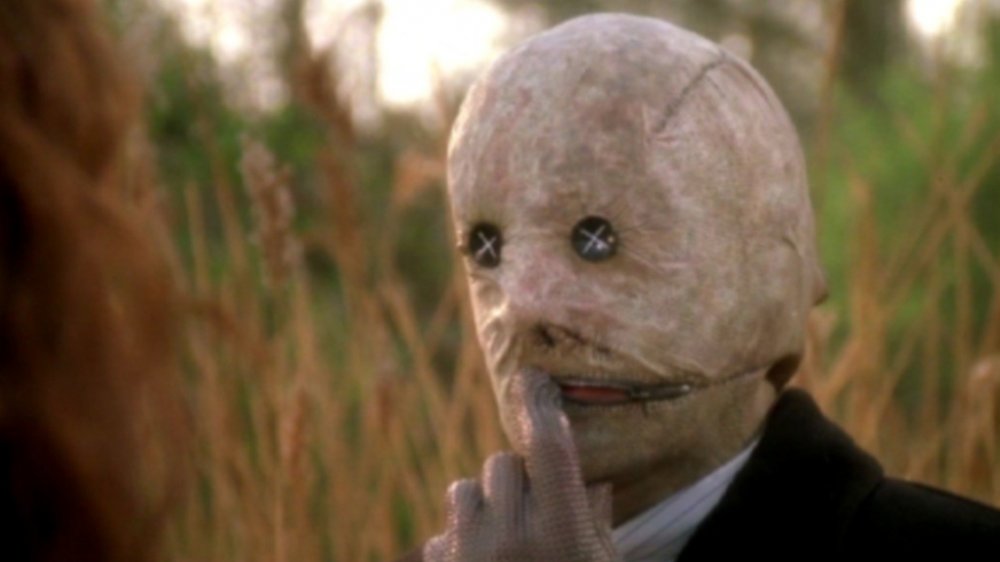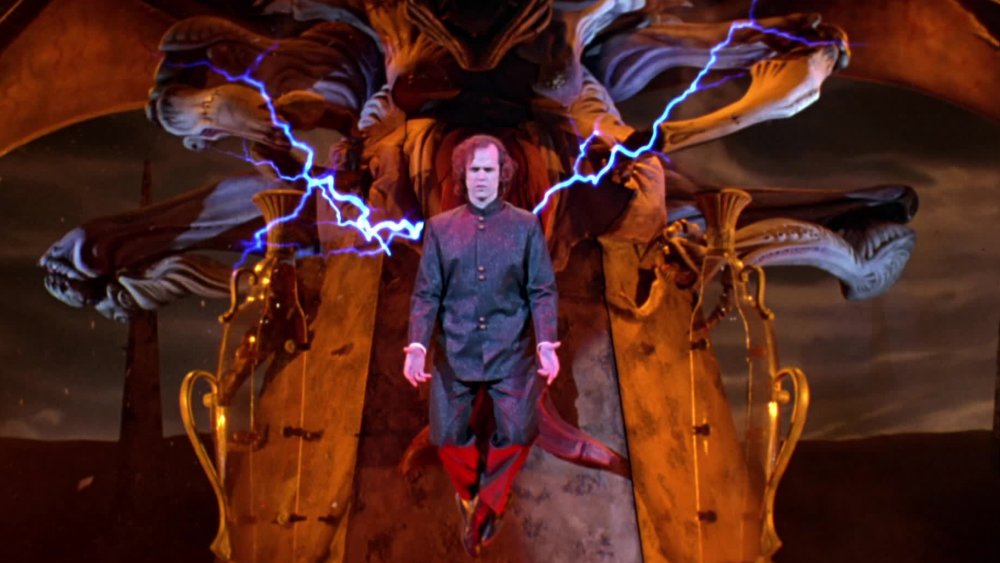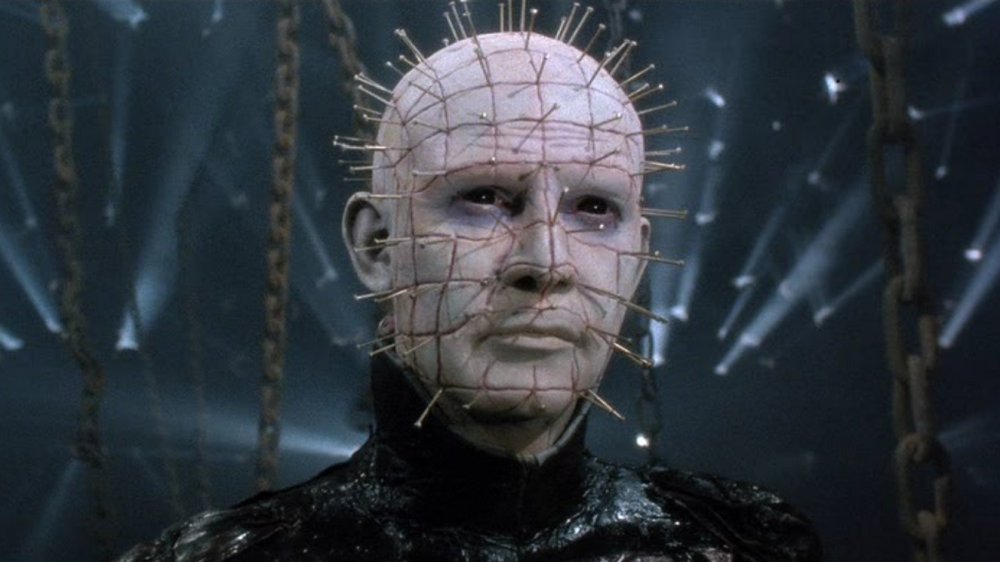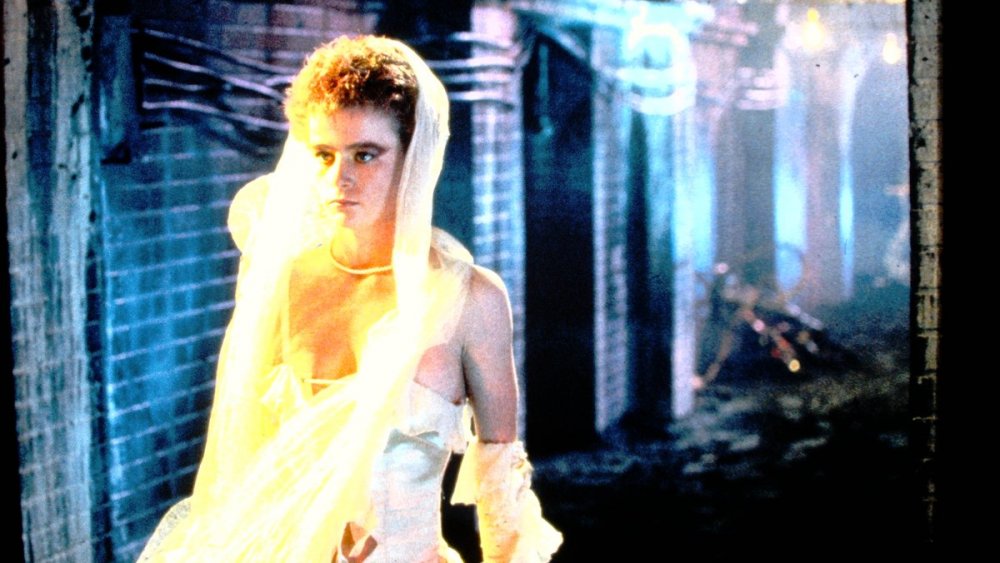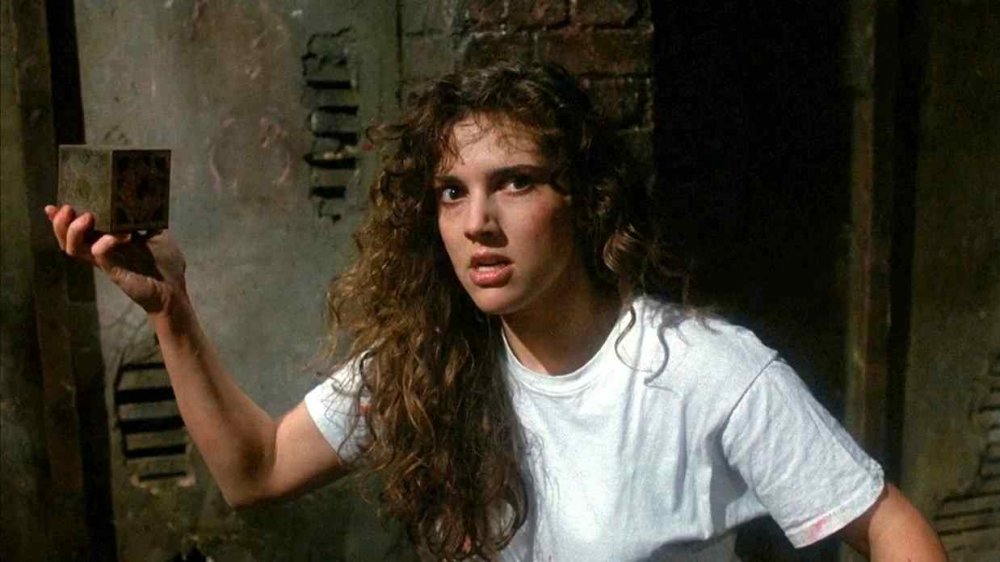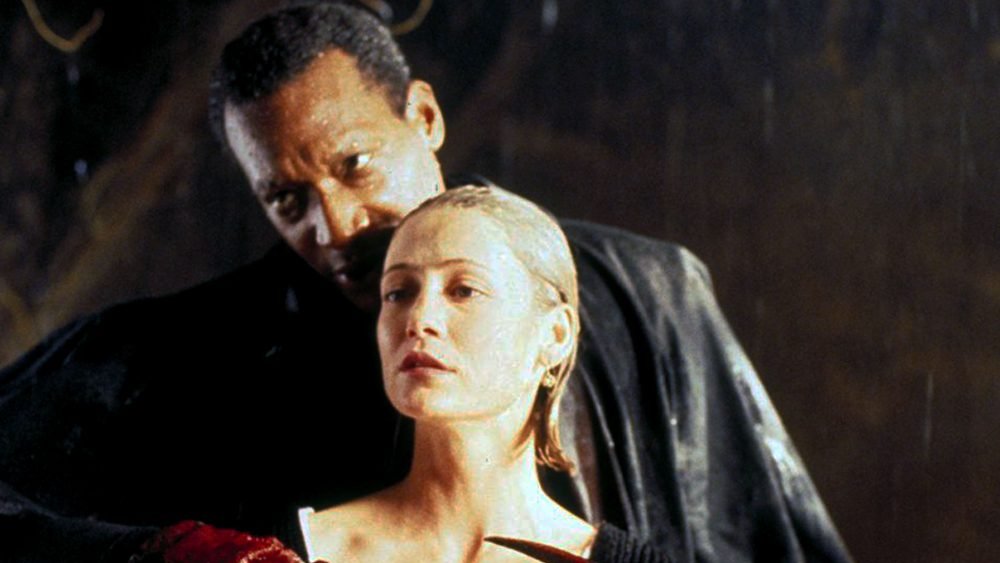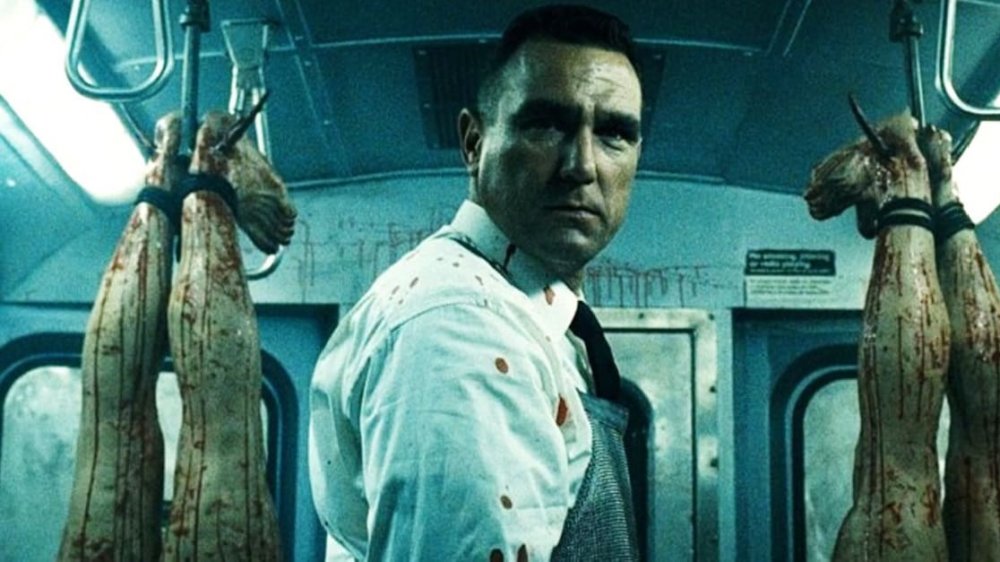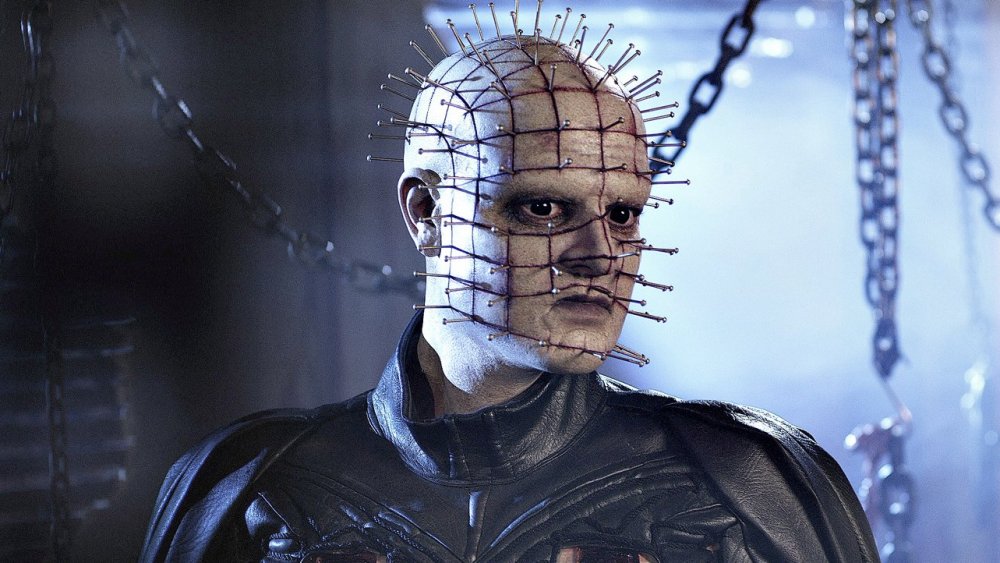Best And Worst Clive Barker Adaptations
In the ads for Hellraiser, Stephen King gave a quote any writer would kill for: "I have seen the future of horror, and its name is Clive Barker."
And indeed, with this crucial endorsement, Clive Barker suddenly became a force to be reckoned with in the world of terror. While Barker hasn't had the same popularity and impact as King, he certainly made his own wonderfully bloody mark in literature and on the big screen.
As is the case with King, much of Barker's work has been adapted for various screen projects, and just like King, there are great, good, bad, and downright awful Barker adaptations as well. It can be a little daunting to approach this type of filmography if you don't know what you're getting yourself into, but you don't need to watch blindly — here's a look at the best and worst Barker adaptations, including at least one that many fans continue to debate today.
Best: Candyman
With 1992's Candyman, Barker didn't top Hellraiser, but he created a new story and character that has held up well in its own right. An adaptation of his short story The Forbidden, the film stars Tony Todd as an urban legend, a malevolent spirit who was the son of a slave killed for being with a white woman. (This also makes Candyman a powerful character in an age of racial turmoil, making the story ahead of its time as well.)
Roger Ebert, who didn't care for Hellraiser much, gave Candyman three stars, and was intrigued by the idea that an urban legend could become real if enough people believed in it. "What I liked was a horror movie that was scaring me with ideas and gore," he observed, "instead of simply gore."
The film's themes resonate more than ever. As Manuela Lazic wrote for The Ringer, "Before Get Out, there was Candyman. The urban legend about the hook-handed terror was a radical, sophisticated examination of race, history, and love that feels as powerful and essential today as when it was released more than 25 years ago."
Worst: Rawhead Rex
Before Hellraiser, Barker's best-known big-screen adaptation was Rawhead Rex, which wasn't a great representation of what he was capable of. In fact, Barker finds it an embarrassment, but it does have its fans, many of whom find it good for laughs.
As Barker told the publication Dread, he was approached about making this 1986 movie before he'd even released Books of Blood, the collection the story's from. He sold off the rights to five stories, and the first one that got made was Rawhead Rex. Barker wrote the script, the second screenplay he'd ever written, but he was ultimately disappointed with the end result, and he clearly regrets not being in control as a director.
The monster looked pretty silly too, but as Barker later explained, "I didn't actually think the design for the monster itself bad at all, and I love the poster, but I wasn't comfortable with the picture. It just didn't get there... the movie followed the beats of the screenplay. It's just that monster movies.by and larger, are made by directorial 'oomph' rather than what's in the screenplay. It's Spielberg's genius that turns [Jaws] into a scary movie, not actually the screenplay."
Best: Nightbreed
While Clive Barker doesn't have to be totally in control of a project for it to be good, it certainly doesn't hurt, and with 1990's Nightbreed, he not only crafted the screenplay adaptation, but directed as well. The results are a wonderfully inventive new world of creatures, with horror master David Cronenberg in a featured role as the villain.
One report even felt it could have been the Star Wars of horror, which was clearly Barker's ambition. 20th Century Fox invested a substantial amount of money for the time for a horror film — $11 million — and Barker built a big world of terror with sets at Pinewood Studios. The story also had gay subtext, with one critic noting that Nightbreed "anticipated the pro-mutant (i.e. pro-queer) sensibility of Bryan Singer's X-Men movies."
While the film was greeted with a tepid response at the box office, it's still one of Barker's most ambitious adaptations. It might have been ahead of its time when it first came out, but it's certainly still beloved by fans to this day.
Worst: Lord of Illusions
It's tough to figure out where to land with Lord of Illusions, because while it's certainly not Barker's best, and it has plenty of detractors, opinion is often very divided on this one, with some fans strongly defending it and urging others to give it another chance.
Writing for Bloody Disgusting, Jonathan Barkan admitted that when he first saw Illusions, it was a film he "struggled to enjoy," although he hastened to add that he's since come around, writing, "After repeated visits, it now ranks as one of my favorite horror films of the '90s, and one of my favorite horror films in general." What made a big difference for Barkan was seeing the director's cut, which he felt was "the vision from Clive Barker that felt right."
Daily Dead called Lord of Illusions "Barker's least-loved film," but also confirmed that the director's cut did a lot to bring the film up from bad status to underrated cult status. "The movie is moody and atmospheric... the years have been good to Lord of Illusions." An unfortunate footnote to this saga? Barker hasn't directed a movie since Illusions.
Best: Hellraiser
Before he'd even broken through, Clive Barker's work had already inspired several embarrassing adaptations, but he finally got it right with 1987's Hellraiser, and it immediately established his brand name in horror. Directed by Barker himself, the film is an adaptation of his novella The Hellbound Heart, a project he was able to get made for a paltry $900,000 at Roger Corman's New World Pictures. But Barker brilliantly transcended Corman's cheapo origins, bringing his story to the screen in a terrifying netherworld with a twisted S&M bent.
Barker was now in control as a writer/director, and he was able to complete his vision to his satisfaction. He also gave us one of horror's best franchise characters, Pinhead, played by Doug Bradley. Like Darth Vader in Star Wars or Hannibal Lecter in Silence of the Lambs, Pinhead isn't in the movie long — only about eight minutes — but he didn't need much time to leave his mark.
As Bradley later recalled, "When I came to the States for the first time for a Fangoria horror convention, there was a line of fans going out of the hotel and round the corner... That's when I realized Pinhead had taken off with horror fandom. He represents the Faustain bargain: the things we desire will come at a price."
Worst: Underworld
While Rawhead Rex has fans that can have a good chuckle at it, the first movie adapted from one of Clive Barker's works, 1985's Underworld (retitled Transmutations in the U.S.), is long forgotten today, and deservedly so.
With Underworld, Barker wanted to make a movie where gangsters meet monsters, much like John Landis did with Innocent Blood. Yet unlike Stephen King, who had a great first adaptation with Carrie, Barker wasn't so lucky. In fact, Underworld may be Barker's biggest cinematic regret.
As the author later explained, "I wanted to make a kind of hard-nosed, stylized, noirish piece of work. It was directed by a guy who had no flair whatsoever for either monster-making or gangster stuff. It was sold by its producers to the money people as a kind of rock video, I think. And the result was this terrible movie."
Horrornews critic Ryne Barber agreed with Barker's negative assessment, lamenting, "There aren't many films that keep me disinterested throughout the entire thing. Apparently, Transmutations is one of them, because it took all of my willpower to make it through this slog."
Best: Hellraiser II: Hellbound
Coming a year after the release of the first Hellraiser — and released during the Christmas holiday weekend, of all times — Hellraiser II: Hellbound is the rare sequel that takes a big step up from the original. There were clearly major franchise possibilities for Hellraiser, and Hellbound serves as a strong follow-up that takes up right where the first one ended, avoiding the sophomore jinx that comes with a lot of sequels.
Hellbound even got some grudging respect from some critics. The Los Angeles Times wrote, "This follow-up is faster and campier than its mostly somber predecessor, but the basic grim tenets of British horror author Clive Barker's supernatural worldview are still intact." IGN also felt that Hellbound was "gorier, larger, and more accessible than the first. It also manages to give the villain some memorable lines without making him a caricature like Freddy Krueger."
It's remained mostly unfulfilled ever since, but the first two Hellraisers showed a hell of a lot of promise for the franchise.
Worst: Candyman Farewell to the Flesh
While Hellraiser had a strong first sequel, the same can't be said for the second Candyman. Released in 1995, Candyman: Farewell to the Flesh had a great director at the helm in Bill Condon (Gods and Monsters, Dreamgirls), but it just couldn't deliver the goods.
As Roger Ebert argued in his two-star review, "The movie doesn't develop, alas, with the patience and restraint of the earlier film." Ebert went on to point out that this follow-up doesn't make the strong statement that its predecessor did. "I suppose that Clive Barker would be happy to explain to us that Candyman: Farewell to the Flesh is a statement against racism, and maybe it is, although it sure does go the long way around."
Yet years later, the film does have its defenders. Writing for ScreenRant, Jack Wilhelmi called Farewell to the Flesh "a worthy sequel despite poor reviews" and added, "While it may still pale in comparison to its predecessor, Candyman: Farewell to the Flesh deserves more acclaim."
Best: Midnight Meat Train
Released in 2008, Midnight Meat Train would prove to be one of Barker's best adaptations in years — and it went back to the beginning of his career, taking another chapter from Books of Blood. Meat Train was lucky enough to snag a pre-fame Bradley Cooper, and it strongly re-established Barker's name as a master of terror for a new generation.
Unfortunately, there was terrible behind-the-scenes drama with Meat Train at Lionsgate, with the studio essentially dumping it, fueling the ire of horror fans. Reportedly, the Meat Train trailer got the highest test scores in the company's history, but at the time, some studios were giving movies bottom-line theatrical releases so they could get them onto the then booming DVD market as fast as possible. Sadly, this is apparently what happened with Meat Train.
Barker publicly denounced Lionsgate to the press, telling MTV News he was "very proud that the movie is surviving the nonsense" and adding, "It's starting to have a cult life... the politics that are being visited upon [the movie] have nothing to do with the movie at all. I mourn the fact that Midnight Meat Train was never given its chance in theaters, it's a beautifully stylized scary movie, and it isn't going anywhere."
Worst: Hellraiser: Revelations
The Hellraiser series started strong, but it couldn't get back on track after Hellbound, although it certainly made plenty of attempts. After a series of subpar sequels, the franchise hit an all-time low with its ninth installment, 2011's Hellraiser: Revelations, which made the big mistake of going forward without Doug Bradley playing Pinhead.
As Bradley announced before the production moved on without him, "I have decided not to participate. The ink is barely dry on the script, and it is scheduled to be in front of the cameras in two weeks time... One way or another, this does not seem to me to represent a serious attempt to revive the Hellraiser franchise."
Clive Barker also hilariously roasted the film on Twitter, profanely denying any level of involvement with the sequel and promising fans, "If they claim it's from the mind of Clive Barker, it's a lie. It's not even from my butt-hole."
